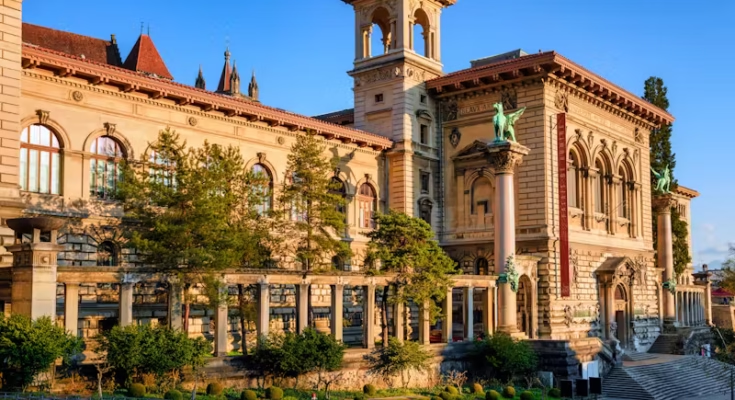Universities That Shape Science and Technology Switzerland, a small nation at the heart of Europe, is a global powerhouse in science and technology, renowned for its innovative universities that drive advancements in research and education. Despite its population of just 8.7 million, Switzerland hosts several institutions consistently ranked among the world’s best, producing groundbreaking research and nurturing future leaders in fields like engineering, computer science, and life sciences. Universities such as ETH Zurich and EPFL lead the charge, with a legacy of Nobel Laureates and cutting-edge facilities. This article explores the top Swiss universities shaping science and technology, highlighting their academic excellence, research contributions, and appeal to international students, drawing on recent data and insights from global rankings.
ETH Zurich (Swiss Federal Institute of Technology)
Overview
Founded in 1855, ETH Zurich is Switzerland’s premier science and technology university, ranked 5th globally in the QS World University Rankings 2026 and 11th in the Times Higher Education (THE) World University Rankings 2025. With approximately 24,500 students, including 35% international students from over 120 countries, ETH Zurich is a hub for innovation, located in the vibrant city of Zurich.
Academic and Research Excellence
ETH Zurich excels in engineering, computer science, physics, and mathematics, offering programs like the Bachelor’s in Mechanical Engineering and Master’s in Data Science, primarily in English at the postgraduate level. Its research output is remarkable, with over 20 Nobel Prize Laureates, including Albert Einstein, who studied and taught there. The university’s 16 departments conduct pioneering research in areas like quantum computing, robotics, and sustainable energy, supported by facilities like the Swiss National Supercomputing Centre.
Recent initiatives, such as the ETH Swiss GeoLab in Lucerne (opening 2027, funded by a CHF 100M donation from the Jörg G. Bucherer Foundation), leverage AI and satellite data to address disasters and advance agri-tech. ETH Zurich’s strong industry ties with companies like Google and IBM provide students with internships and collaborative projects, enhancing employability. In 2024, ETH Zurich ranked first in Switzerland for engineering and computer science (UniversityGuru).
Student Life
Zurich, Switzerland’s largest city, offers a dynamic student experience with cultural landmarks, vibrant nightlife, and proximity to the Alps. On-campus housing costs CHF 500–1,000/month, and student associations like VSETH organize events, fostering community. With 95% of Swiss residents proficient in English (EF English Proficiency Index 2024), international students integrate easily, though German is the primary undergraduate teaching language.
Why It Shapes Science and Technology
ETH Zurich’s rigorous academics, world-class faculty, and industry partnerships produce graduates who lead in tech giants, startups, and academia. Its global alumni network, including Turing Award and Fields Medal winners, ensures lasting impact in science and technology.
École Polytechnique Fédérale de Lausanne (EPFL)
Overview
Founded in 1853, EPFL in Lausanne is Switzerland’s second federal institute of technology, ranked 26th globally (QS 2025). With 12,500 students from over 125 countries (56% international undergraduates), EPFL is one of Europe’s most diverse universities, located on the picturesque shores of Lake Geneva.
Academic and Research Excellence
EPFL specializes in engineering, computer science, and robotics, offering English-taught programs like the Master’s in Robotics and Bachelor’s in Life Sciences Engineering. Its School of Engineering runs 25 cutting-edge laboratories, including 12 dedicated to robotics, and the university co-leads the Swiss National AI Institute with ETH Zurich. Research highlights include breakthroughs in artificial intelligence, biomedical engineering, and sustainable energy, with collaborations involving NASA, CERN, and Tesla.
EPFL’s campus, spanning 136 acres, features state-of-the-art facilities powered by hydropower, reflecting its commitment to sustainability. Tuition is remarkably affordable at CHF 1,540/year for both Swiss and international students, making it a top choice for global talent. The university’s innovation ecosystem, including startup incubators, has fostered companies like Logitech, a global tech leader.
Student Life
Lausanne’s cultural richness, with venues like Victoria Hall and proximity to ski resorts, enhances student life. Housing costs CHF 400–900/month, and over 20 sports teams and cultural events like the Balélec Festival create a vibrant community. EPFL’s international outlook and English-taught postgraduate programs ease integration for global students, with French as the primary undergraduate language.
Why It Shapes Science and Technology
EPFL’s focus on interdisciplinary research, affordable tuition, and global partnerships produces innovators in AI, robotics, and sustainability. Its diverse campus and industry connections ensure graduates are equipped for leadership in global tech ecosystems.
University of Zurich (UZH)
Overview
Founded in 1833, the University of Zurich is Switzerland’s largest university, with over 25,000 students, including 20% international students. Ranked among the top 80 globally (QS 2025), UZH is a leader in life sciences, medicine, and computer science, located in Zurich’s academic hub.
Academic and Research Excellence
UZH offers diverse programs, including the Master’s in Computational Science and Bachelor’s in Biomedicine, with many English-taught options at the postgraduate level. Its Faculty of Medicine, part of the University Medicine Zurich network, excels in precision medicine and oncology, collaborating with ETH Zurich and university hospitals. UZH ranks first in Switzerland for computer science and journalism (UniversityGuru, 2025).
The university’s research output, with 1.04 million academic publications and 38.3 million citations, underscores its global impact (EduRank, 2025). Notable alumni include Albert Einstein and pioneers in neuroscience, driving advancements in health and technology.
Student Life
Zurich’s cosmopolitan vibe, with cultural sites like the Kunsthaus and a thriving tech scene, offers a dynamic student experience. Housing costs CHF 500–1,200/month, and student organizations like the International Students Association foster community. UZH’s central location ensures easy access to Switzerland’s public transport network.
Why It Shapes Science and Technology
UZH’s interdisciplinary approach and leadership in life sciences and computer science produce graduates who innovate in healthcare, tech, and research. Its global research networks and diverse programs ensure students are ready for impactful careers.
University of Geneva (UNIGE)
Overview
Founded in 1559 by Jean Calvin, the University of Geneva is a prestigious institution with 17,000 students, including over 40% international students. Ranked among the top 100 globally (QS 2025), UNIGE is located in Geneva, a hub for international organizations like the UN and CERN.
Academic and Research Excellence
UNIGE excels in physics, astrophysics, and life sciences, offering programs like the Master’s in Particle Physics and Bachelor’s in Neuroscience, many in English. Its research strengths include collaborations with CERN, where UNIGE researchers contribute to particle physics discoveries, and the Integral Science Data Centre for space research. With over 500 programs, including 129 bachelor’s and master’s degrees, UNIGE fosters interdisciplinary innovation.
The university’s location in Geneva provides unique networking opportunities with global organizations, preparing students for careers in science and diplomacy. UNIGE ranks first in Switzerland for law and is a leader in life sciences (UniversityGuru, 2025).
Student Life
Geneva’s international vibe, with its lakeside setting and cultural events, creates a vibrant student experience. Housing costs CHF 500–1,000/month, and student societies, including those tied to international organizations, enhance networking. English and French proficiency ensures accessibility for global students.
Why It Shapes Science and Technology
UNIGE’s research excellence and proximity to global institutions like CERN position graduates to lead in physics, life sciences, and international science policy, driving global innovation.
University of Basel
Overview
Founded in 1460, the University of Basel is Switzerland’s oldest university, with 13,000 students, including 27% international students. Ranked 131st globally (QS 2025), it excels in life sciences, nanoscience, and sustainability, located in the historic city of Basel.
Academic and Research Excellence
Basel’s programs, such as the Master’s in Molecular Biology and PhD in Nanoscience, emphasize cutting-edge research. The university’s strategic partnerships with pharmaceutical giants like Novartis and Roche drive advancements in drug development and biotechnology. Its focus on sustainability, supported by facilities like the Landesbibliothek Thurgau Library, aligns with global priorities.

Basel’s research output and international faculty ratio rank highly, reflecting its global outlook (QS 2025). The university’s mid-sized, student-friendly environment fosters collaboration and innovation.
Student Life
Basel, voted one of the world’s most beautiful cities by National Geographic, offers a rich cultural scene with museums like Kunstmuseum Basel. Housing costs CHF 400–900/month, and student life includes history-rich sites and vibrant social events. The university’s multilingual environment (English, German, French) supports international students.
Why It Shapes Science and Technology
Basel’s leadership in life sciences and nanoscience, combined with industry ties, prepares graduates for careers in biotechnology and sustainable innovation, shaping the future of science.
Why Study in Switzerland?
Switzerland’s universities offer unique advantages for science and technology students:
- Global Rankings: ETH Zurich and EPFL rank among the top 30 globally, ensuring prestigious degrees.
- Research Impact: Switzerland produces high-impact research, with 38.3 million citations from 1.04 million publications (EduRank, 2025).
- Affordable Tuition: Fees range from CHF 1,000–2,450/year, significantly lower than other top destinations.
- Multicultural Environment: Students from over 125 countries create a global classroom.
- Industry Connections: Partnerships with CERN, Google, and Roche offer internships and career opportunities.
Practical Considerations
- Admission: Requirements include a high school diploma (equivalent to Swiss Matura) or bachelor’s degree, plus English proficiency (IELTS 6.0–7.5). Applications are submitted directly to universities, with deadlines typically April–June for September intake.
- Visa: Non-EU/EEA students need a student visa, requiring proof of funds (CHF 21,000/year) and health insurance. Processing takes 6–12 weeks.
- Costs: Living expenses range from CHF 1,500–2,500/month. Scholarships like the Swiss Government Excellence Scholarships and university-specific grants support international students.
- Work: Students can work up to 15 hours/week during term time, with no restrictions during holidays. The post-study residence permit allows six months to seek employment.
Challenges and Solutions
- High Living Costs: Budgeting and scholarships mitigate expenses. Shared housing and student discounts help.
- Language Barriers: English-taught programs and free language courses ease integration.
- Housing Competition: Early applications for university residences or platforms like Woko.ch secure affordable options.
Switzerland’s Global Impact
Switzerland’s universities shape science and technology through their research and alumni. ETH Zurich and EPFL drive advancements in AI, robotics, and sustainability, while UNIGE’s work with CERN pushes the boundaries of physics. The country’s four extra-university research centers, like EAWAG for aquatic science, complement university efforts, fostering innovation in health, environment, and technology. With a legacy of 28 Nobel Prizes and a third-place global ranking for startup financing, Switzerland’s academic giants produce graduates who lead in global tech, healthcare, and research.
Conclusion
From ETH Zurich’s pioneering AI research to EPFL’s robotics labs, Switzerland’s top universities—ETH Zurich, EPFL, UZH, UNIGE, and Basel—are shaping the future of science and technology. Their global rankings, affordable tuition, and industry partnerships create unparalleled opportunities for students. Set against Switzerland’s stunning landscapes and multicultural cities, these institutions offer a transformative education that prepares graduates to lead in a tech-driven world. For international students seeking to innovate and impact globally, Switzerland’s academic giants are a gateway to a bright future.



